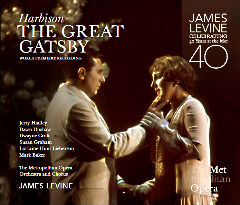
Setting F. Scott Fitzgerald’s American masterpiece of a novel was a very difficult task; one that needed both a deft composer and singers with incredible range and expressive capability. Harbison rises to the challenge admirably, making the clear decision to segregate the tuneful 1920’s jazz-age songs from the contemporary operatic writing of the rest of the drama. He even devotes a singer entirely to the songs on the radio which appear frequently throughout the opera – a young Matthew Polenzani four years before his Richard Tucker Award win.
This evening was also bursting with the best talent in contemporary opera for the day. As Jay Gatsby, Jerry Hadley sang with moving lyricism and cocksure arrogance, tossing off his characteristic repetitions of “old sport” often and with a welcoming familiarity. Dawn Upshaw astounds as his Daisy, singing with her now well-known shining soprano, which brings an ingénue sound to a deeply psychological interpretation.
Adding to the uniformly strong cast is a Dream Team of Mezzos, Hunt Lieberson as Myrtle Wilson and Susan Graham as Jordan Baker. This character established Hunt Lieberson as one of the most promising singers that people had heard at the Met in years. She wields her luscious, versatile voice with careful attention to using expressive diction and dramatic effects only when needed. Her sardonically sexy Myrtle illustrates many of the incredible talents that made her a fast rising star before her tragic death. Graham gets fewer opportunities to flaunt her lovely voice, but still turns in a fine performance, relying on her ability to be both cold and alluring at the same time.
As the thread that runs through all their lives, Dwayne Croft brings his dark, easy voice and well-meaning interpretation to the somewhat less featured Nick Carraway. While he doesn’t factor much into the drama of the piece – it really revolves around Gatsby and Daisy – Croft certainly has the longest sing of the night which he handles with no sign of strain.
Levine conducts a wonderfully varied score, consisting of everything from authentic 1920’s early jazz to a multi-layered scene involving the Lohengrin wedding chorus and a thickly dissonant confrontation ensemble, with command and consistency. The music is wonderfully unique, effortlessly flowing between Harbison’s not-so-atonal-that-it-won’t-play-in-the-suburbs sonic pallette and newly written popular tunes. It is hard to image such an individual work came out of a previously existing story, but the world of Fitzgerald’s Gatsby is beautifully crafted in this score.
I never saw this show live, and in a way I’m a little happy about that. When I listen to this marvelous recording I imagine the story vividly in my mind as some sort of Fellini film; sudden cuts to unrelated scenes where the story plays out quickly and with vivid emotions. I doubt that this kind of story telling could be so effective live on the operatic stage, especially before the current crop of directors who use video projections so well.
In short, this recording stands as an homage to two amazing artists who sadly passed before their time, Hadley at 55 by his own hand and Hunt Lieberson at 52 from breast cancer. For this alone it is worth seeking out, but the work as a whole is stunning by its own merit, certainly musically and possibly dramatically under the right circumstances.


